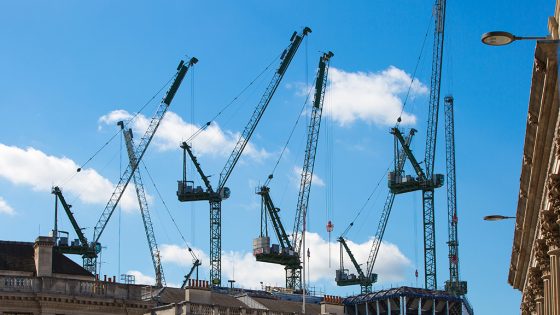Substantial growth in the infrastructure sector is expected over the next 12 months, according to new research.
In its latest UK Construction Monitor, released this morning, the Royal Institution of Chartered Surveyors (RICS) described infrastructure as “the standout performer” that will “drive the bulk of the overall growth in activity” expected across the construction industry.
Activity across the construction sector is set to grow by around 17 per cent in the year to March 2026, a slight fall compared with the 20 per cent increase expected in RICS’ previous survey in late 2024.
Work in the infrastructure sector is expected to grow by 32 per cent, while survey respondents reported a net figure of +13 per cent for its headline question of how workloads had changed within the infrastructure sector over the first quarter (Q1) this year.
That was mainly due to the “robust” energy sector, which grew by 35 per cent in Q1, mainly thanks to activity in “significant energy infrastructure projects” such as Hinckley Point C and offshore wind farm projects. Work in the rail sector flatlined, though.
Across the construction sector, headline activity fell by 1 per cent in Q1 – the same as in the previous quarter.
RICS also reported a “divergence in activity” across the construction sector, as new-build work in Q1 tightened by 1 per cent compared with the last quarter. Repair and maintenance workloads rose by 11 per cent.
Profit margin expectations were down, though, coming in at -12 per cent compared with -7 per cent last time round.
RICS chief economist Simon Rubinsohn said the flat sector-wide figure suggested respondents had expressed “a little more caution in the face of the heightened level of uncertainty both at a global and domestic level”.
That could also explain the drop in profit margin expectations, he added.
“In particular, concerns about the implementation of tariffs and what this might mean for costs and economic activity as well as the potential impact of the uplift in employer NI contributions are highlighted in the feedback,” Rubinsohn said.
Survey respondents also warned that regulatory and planning issues, as well as financial constraints on their operations, were causing problems.
Credit conditions in particular worsened over the last quarter, the RICS survey found, with a net balance of -21 per cent.
Rubinsohn also warned that addressing concerns around the planning system was “critical if the ambitions around housing and infrastructure are to be met”.
Hiring expectations within the sector, meanwhile, were positive, holding steady at +15 per cent for the next year.
The concerns over the impact of US tariffs on the construction industry mirror warnings made by the Construction Products Association (CPA) earlier this week.
The CPA warned tariffs represented “a big risk” to the sector’s recovery, and that big private sector projects could stutter while investors wait to gauge the outcome and impact of global import duty hikes.

